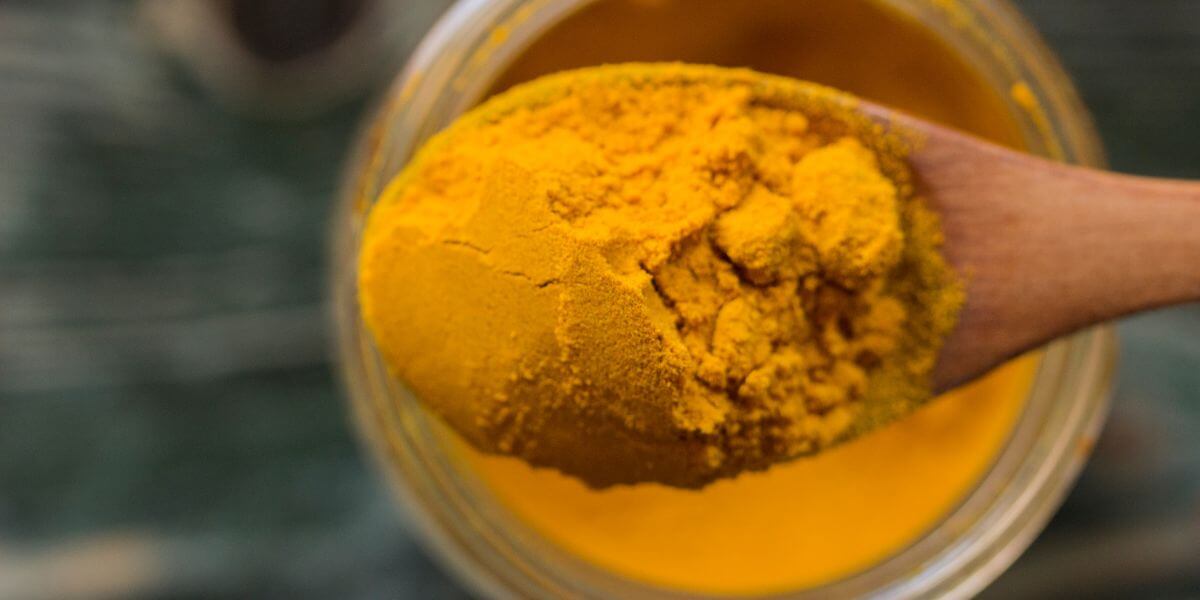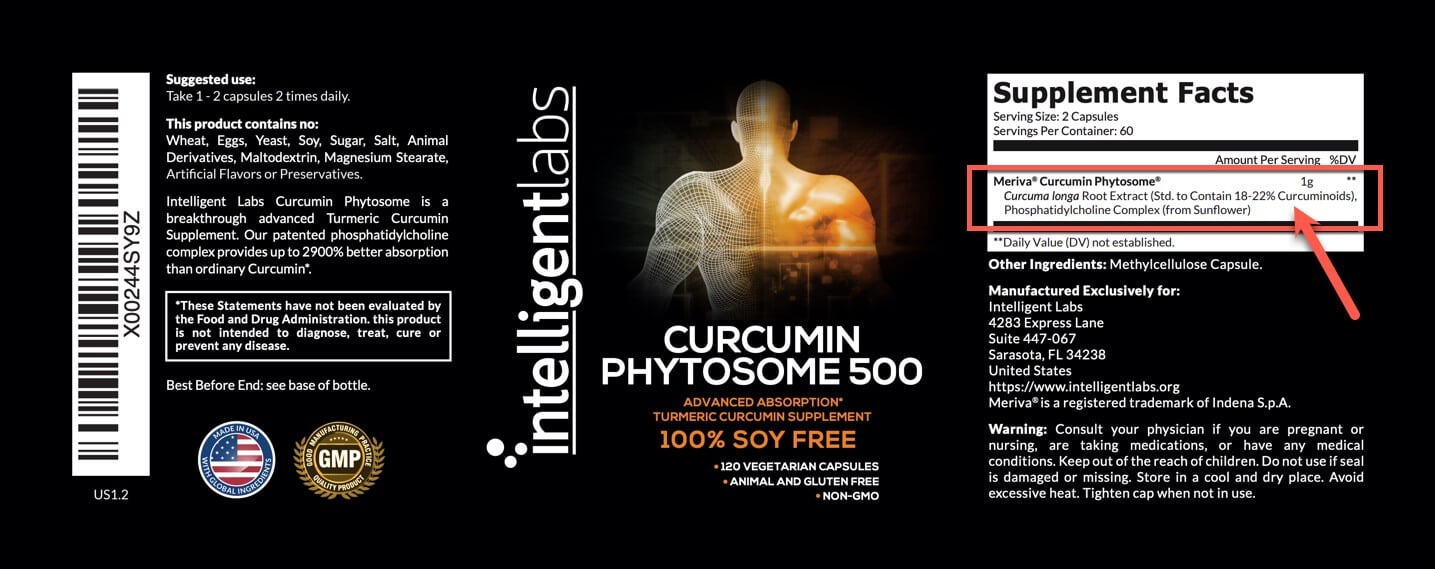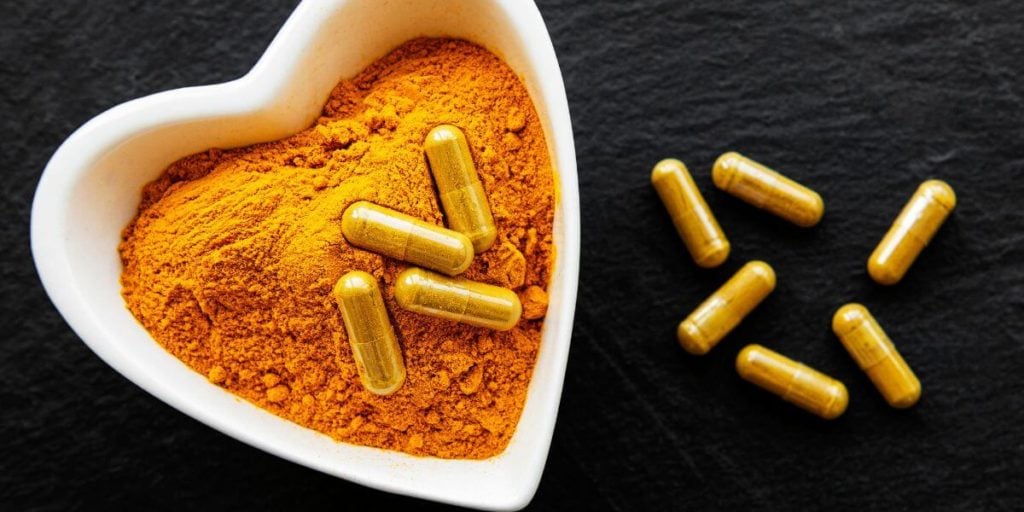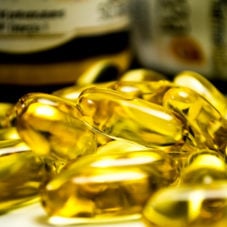Turmeric powder is everywhere. It’s on spice racks, in golden milk lattes, and now in beauty products, too. It adds color, flavor, and a wellness halo to everything it touches. But if you’re here searching for the best turmeric powder, chances are you’re not just looking for a kitchen spice. You’re after the health benefits, specifically, the kind linked to turmeric’s active compound, Curcumin.
So, does the best turmeric powder actually exist? Or is there a better way to get all the benefits without spooning heaps of powder into your meals? Let’s break it down.
Table of Contents
What are the components of turmeric powder?
Curcumin is the reason turmeric is considered a functional food. But here’s the catch: turmeric powder contains only a small amount of curcumin. And even that isn’t always guaranteed. Here’s a quick breakdown of what makes up turmeric:1
- Carbohydrates – 60-70%
- Water – 6-13%
- Protein – 6-8%
- Fat – 5-10%
- Dietary minerals – 3-7%
- Essential oils – 3-7%
- Dietary fiber – 2-7%
- Curcuminoids – 1-6%
Curcuminoids are the compounds responsible for turmeric’s health properties. There are three main types:2
- Curcumin – about 77% of curcuminoid content
- Demethoxycurcumin – 17% of curcuminoid content
- Bisdemethoxycurcumin – 3% of curcuminoid content
So when you see “curcuminoids” on a label, that includes all three. But curcumin is the star player. It’s the compound most often studied for its anti-inflammatory and antioxidant effects.

Are there any problems with ordinary turmeric powder?
Short answer? Yes, especially if you’re taking turmeric for the health benefits.
A typical serving of turmeric powder is about ½ teaspoon (roughly 2g). While that’s plenty for flavoring your food, it contains only a small amount of curcuminoids and even less curcumin. And because curcumin isn’t standardized in regular turmeric, this makes it hard to know if you’re getting enough to make a difference.
But that’s just part of the problem. Even if you manage to get a decent amount of curcumin from turmeric powder, it’s very poorly absorbed by the body.
In one study, researchers found no detectable curcumin in the blood of volunteers who took up to 8g of unformulated curcumin powder. Only at extremely high doses (10-12g) did trace amounts show up.3
That kind of dosing just isn’t realistic for most people.
So while turmeric powder is great in the kitchen, it falls short as a reliable source of curcumin. That’s why, if you’re looking to get the actual health benefits, regular turmeric powder probably isn’t the best option.
Are there any products that standardize the curcumin content?
Yes! Unlike regular turmeric powder, many curcumin supplements are standardized. That means they contain a measured, consistent amount of curcuminoids per dose. You’ll usually find this listed on the product label in the Supplement Facts panel.
Here’s an example from our Intelligent Labs Meriva® Curcumin Phytosome:

To make things easier, we compared a few different supplements that disclose their curcuminoid content:
| 1st Brand | 2nd Brand | 3rd Brand | Intelligent Labs Curcumin | |
| Serving size | 3 capsules | 1 soft gel | 1 tablet | 2 capsules |
| Turmeric per serving | 1350mg | 800mg | 632mg | 1000mg |
| Amount of curcuminoids per serving (from the label) | 150mg | 48mg | 600mg | 180mg-220mg |
| Estimated curcumin content (77% of curcuminoids) | 115.5mg | 36.96mg | 462mg | 138.6mg – 169.4mg |
At first glance, Brand #3 looks like the winner with 600mg of curcuminoids (that’s around 462mg of curcumin).
But there’s a catch.
Brands 1-3 all use unenhanced turmeric powder. That means you’re still dealing with the same absorption issue we mentioned earlier. Most of the curcumin just doesn’t make it into your bloodstream.
In contrast, our Meriva Curcumin supplement uses a patented phytosome delivery system. In a study comparing bioavailability, Meriva curcumin was shown to be up to 29x (or 2,900%) more absorbable than standard curcumin.4
So yes, while our product contains a smaller dose of curcuminoids on paper, the actual amount your body absorbs is significantly higher.
That’s why standardization + enhanced delivery matters. It’s not just what’s on the label, it’s what your body can actually use.
What are the benefits of taking the best turmeric powder?
When we say “best turmeric powder,” we really mean a turmeric supplement with standardized curcumin and enhanced absorption. Because that’s what actually delivers the benefits most people are hoping for.
Curcumin – turmeric’s active compound – has been studied for its effects on a wide range of health concerns. Research suggests it may help:5 6 7 8
- Fight chronic inflammation (including managing osteoarthritis symptoms)
- Act as a natural pain reliever (analgesic)
- Neutralize free radicals thanks to its antioxidant properties
- Support brain health and mood
- Improve outcomes in metabolic conditions like obesity (may help with weight loss)
- Even play a role in cancer prevention and therapy
But to get those effects, absorption is everything. And that’s where most turmeric powders, and even many supplements, fall short.
With Meriva’s phytosome technology, curcumin is bound to a non-allergenic, soy-free phospholipid (phosphatidylcholine), which helps your body absorb it far more effectively. That means you’re not just taking curcumin, you’re actually benefiting from it.
How is turmeric powder made anyway?
Most commercial turmeric powders come from the dried rhizome (this is the part of the plant that grows underground). The process usually includes:9
- Boiling to remove odor and improve color
- Drying, either by sun or more advanced methods (e.g., vacuum or freeze-drying)
- Polishing and grading based on quality
- Grinding and sifting into powder form. Then sifting it through different-size mesh screens to finally arrive at the powdered form.
These steps affect curcumin content and quality. And since powder isn’t standardized, you still won’t know how much active curcumin you’re getting or how well your body can absorb it.
Final thoughts: What really is the best turmeric powder?
If you’re looking for a turmeric powder to spice up your meals, any culinary-grade option will do. But if your goal is to get the anti-inflammatory, antioxidant, and brain-supporting benefits of curcumin, then most turmeric powders won’t cut it.
The best turmeric powder (in the sense that most people mean it) is one that:
- Standardizes curcumin content
- Solves the bioavailability issue
- And is backed by real clinical data
That’s why we recommend Meriva Curcumin Phytosome. It’s soy-free, non-GMO, and uses a patented delivery system to help your body actually absorb and benefit from the curcumin. It’s also third-party tested, so you know everything on the label is 100% accurate!
💬Have questions about curcumin or turmeric supplements? Drop them in the comments below. We’d love to help.
📩 If you want more science-backed health tips and supplement insights, don’t forget to sign up for our newsletter. We keep it smart, useful, and spam-free.
References
- Nelson, Kathryn M et al. “The Essential Medicinal Chemistry of Curcumin.” Journal of medicinal chemistry vol. 60,5 (2017): 1620-1637. doi:10.1021/acs.jmedchem.6b00975 ↩︎
- Lee W-H, Loo C-Y, Bebawy M, et al. Curcumin and its derivatives: their application in neuropharmacology and neuroscience in the 21st century. Current neuropharmacology. 2013;11(4):338-78.) ↩︎
- Lao, Christopher D et al. “Dose escalation of a curcuminoid formulation.” BMC complementary and alternative medicine vol. 6 10. 17 Mar. 2006, doi:10.1186/1472-6882-6-10 ↩︎
- Cuomo, John et al. “Comparative absorption of a standardized curcuminoid mixture and its lecithin formulation.” Journal of natural products vol. 74,4 (2011): 664-9. doi:10.1021/np1007262 ↩︎
- Anand, Preetha et al. “Bioavailability of curcumin: problems and promises.” Molecular pharmaceutics vol. 4,6 (2007): 807-18. doi:10.1021/mp700113r ↩︎
- Hewlings, Susan J, and Douglas S Kalman. “Curcumin: A Review of Its Effects on Human Health.” Foods (Basel, Switzerland) vol. 6,10 92. 22 Oct. 2017, doi:10.3390/foods6100092 ↩︎
- El-Saadony, Mohamed T et al. “Impacts of turmeric and its principal bioactive curcumin on human health: Pharmaceutical, medicinal, and food applications: A comprehensive review.” Frontiers in nutrition vol. 9 1040259. 10 Jan. 2023, doi:10.3389/fnut.2022.1040259 ↩︎
- Porro, Chiara, and Maria Antonietta Panaro. “Recent Progress in Understanding the Health Benefits of Curcumin.” Molecules (Basel, Switzerland) vol. 28,5 2418. 6 Mar. 2023, doi:10.3390/molecules28052418 ↩︎
- Srinivas.P, & Guddanti, Nirmala & bhavani, s. (2019). Processing of turmeric. https://www.researchgate.net/publication/338118160_Processing_of_turmeric ↩︎




